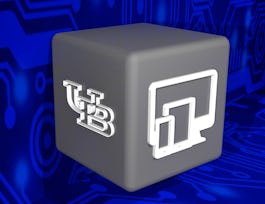The Blockchain Architecture - Intermediate Concepts course is designed for individuals with a basic understanding of digital technologies and foundational knowledge of blockchain principles and platforms. This course will delve deep into the realm of blockchain technology. Building upon the foundational knowledge obtained in the introductory course, this intermediate course offers a detailed look into security considerations, risk management strategies, and an overview of blockchain architecture. The course modules also explore the intricacies of smart contracts, legal and ethical implications of blockchain technology, and various governance models prevalent in the industry.



Blockchain Architecture - Intermediate Concepts
This course is part of Blockchain Solution Architecture Specialization

Instructor: Kris Bennett
Sponsored by Louisiana Workforce Commission
Recommended experience
Details to know

Add to your LinkedIn profile
23 assignments
See how employees at top companies are mastering in-demand skills

Build your subject-matter expertise
- Learn new concepts from industry experts
- Gain a foundational understanding of a subject or tool
- Develop job-relevant skills with hands-on projects
- Earn a shareable career certificate


Earn a career certificate
Add this credential to your LinkedIn profile, resume, or CV
Share it on social media and in your performance review

There are 8 modules in this course
Welcome to Blockchain Solution Architecture -Intermediate Concepts. This course is designed to delve deeper into the realm of blockchain technology. It builds upon the foundational knowledge gained in the Fundamentals of Blockchain Architecture course, and offers a detailed look into security considerations, risk management strategies, and an overview of blockchain architecture. We will also explore the intricacies of smart contracts, legal and ethical implications of blockchain technology, and various governance models prevalent in the industry.
What's included
1 video4 readings
This module provides an in-depth analysis of blockchain security at multiple levels. It covers smart contract security issues like reentrancy, integer overflow, and more. It discusses protocol-level security aspects including consensus algorithms, incentive mechanisms, and cryptography. Network-level security topics include Eclipse attacks, Sybil attacks, and ways to harden blockchain networks against risks. Students will learn to evaluate security tradeoffs and strengthen blockchain solutions.
What's included
12 videos2 readings4 assignments1 discussion prompt1 plugin
This module deeply explores the evolving global regulatory landscape for blockchain and cryptocurrencies. It examines existing regulations across major jurisdictions and identifies gaps. It covers legal issues like data privacy, AML/KYC, custody, and more. Students will analyze case studies of enforcement actions. The module looks at self-regulatory efforts and trends in regulating DeFi and NFTs. Students will gain perspective on navigating the complex, uncertain regulatory landscape.
What's included
6 videos2 readings4 assignments2 discussion prompts1 plugin
This comprehensive risk management module examines risks across multiple dimensions. Enterprise risks include technology failures, stakeholder alignment, and solution viability. Geopolitical risks cover government stances, legal ambiguity, and jurisdictional differences. Market risks include volatility, speculation, and maturity. Reputational risks arise from partnerships, social impacts, and public perception. Students will evaluate ethical risks and compliance with evolving regulations. The module equips students to develop a blockchain risk management plan.
What's included
6 videos2 readings3 assignments1 discussion prompt2 plugins
This module covers best practices for properly documenting blockchain solutions. This includes crafting an executive overview, problem statement, SMART goals, guiding principles, solution architecture, timeline, risk assessment, and data dictionary. Students will learn how documentation increases solution clarity, alignment, and governance. Proper documentation practices are essential for blockchain projects to gain approval and funding.
What's included
9 videos1 reading4 assignments2 discussion prompts1 plugin
This module analyzes the unique governance challenges arising from blockchain's decentralized nature. It covers governing shared infrastructure and consortium models. Blockchain-specific concerns like resolving forks are discussed. The module explores the workings of decentralized autonomous organizations (DAOs). Students will compare governance approaches and evaluate applicability based on blockchain architecture and use cases.
What's included
7 videos2 readings4 assignments1 discussion prompt
This module profiles a diverse set of real-world blockchain projects across finance, supply chain, credentialing, media, government, and other industries. Students will examine early successes and failures. The module draws key lessons from these pioneer implementations to reinforce learning from other modules. Students gain perspective on blockchain's real-world potential and limitations.
What's included
8 videos1 reading2 assignments1 discussion prompt
This is a recap of the course and what you have learned.
What's included
1 video1 reading2 assignments
Instructor

Offered by
Why people choose Coursera for their career




Recommended if you're interested in Computer Science

New York Institute of Finance

EIT Digital

University at Buffalo

Open new doors with Coursera Plus
Unlimited access to 10,000+ world-class courses, hands-on projects, and job-ready certificate programs - all included in your subscription
Advance your career with an online degree
Earn a degree from world-class universities - 100% online
Join over 3,400 global companies that choose Coursera for Business
Upskill your employees to excel in the digital economy



